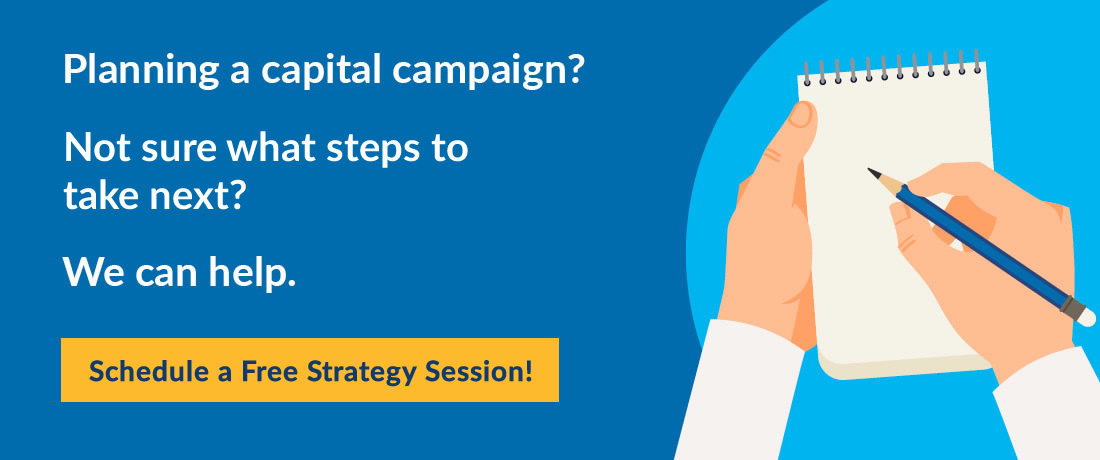4 Tips to Raise Major Gifts for a Campaign without Embarrassing Yourself

Let’s face it, a capital campaign hinges on successfully raising the biggest gifts your organization has ever raised. The idea of raising such gigantic gifts is probably terrifying.
Initially, you’ll need to raise leadership level gifts. These are probably the top ten gifts on your gift range chart and are the largest gifts your campaign will raise. They may be gifts of $1,000,000 or more. In the next stage of the campaign you will raise major gifts. These gifts often range from $25,000 to $500,000 or more, depending on the size of your campaign.
When you solicit both leadership and major gifts, you’ll be asking for very generous amounts.
4 Tips to Raise Major Gifts for a Capital Campaign
Leadership and major gifts will make up well over half of your campaign goal. And the last thing you want to do is be embarrassed by your approach to soliciting them. These four tips will help you ensure you’re prepared to meet with and solicit the donors who might make those gifts.
1. Do Your Homework
Asking a donor for support without knowing anything about them will never feel good and is unlikely to turn out well. It’s like throwing spaghetti at a wall and expecting it to stick.
Before asking for a leadership level or major gift of any kind, do your homework!
Learn about their past giving
Find out what type of other gifts your major donors have made in the past. If they are philanthropists in your community, you may see their names on plaques at other organizations. Your board members or campaign volunteers may know what boards they serve on and you may get a sense of their giving that way. Past giving is a good indicator of a donor’s giving patterns. And while a donor may not give the same amount to your organization, their giving pattern will give you a good starting place in thinking about what that donor might give.
Do basic research
Learn as much as you can about your donors. Ask other people about them. Do searches on google and LinkedIn to gather information. You might also use a wealth screening company, but take that information with a grain of salt. Sometimes research is incomplete or simply wrong (i.e., there are multiple John Smiths).
Doing your homework and having basic information about prior giving, relationships and assets will help you prepare and boost your confidence going into those big solicitation meetings.
Ask your donors questions, but not only for money
Before asking for the biggest gifts, you will need to sit down with potential donors and ask them questions about themselves so you won’t embarrass yourself when asking for the actual gift. Some questions you might ask include:
- Do you see yourself as a lead donor to this campaign? (Share the gift range chart so they have a sense of what leadership level gifts are.)
- How would you feel about being one of the first donor to help jump-start this campaign?
- How important is this [issue / organization / campaign] to you in the scheme of your philanthropic priorities? Could it be your top priority for the next few years?
Honesty is always the best policy
Speak with your donors openly and honestly. Be authentic — let them know you’ve never asked for a million dollars before, but you’ll need a million-dollar gift for this campaign to be successful. Ask them if they’ve ever been asked for or given a million dollars before, and if so, how it felt.
You can also tell donors you’re not yet sure how much to ask for when the time comes, but that you’ll need several gifts of $100K or more for your campaign. Ask them how they would feel being asked for a gift of six figures or more.
There’s no need to feel nervous or embarrassed about these questions — you’re simply gathering information.
2. Increase Your Knowledge
You should have a good, working knowledge about how major gifts are made. They are given with assets, not cash, which means you need to understand what types of assets your organization will accept. And, although you never want to be in the position of giving tax advice, you should understand the basic tax benefits of charitable giving. For example, you should know that if a donor is giving from a donor-advised fund, there are no additional tax benefits. But if they give appreciated stock, they they will receive a tax benefit. Become familiar with gifts of life insurance, gifts from retirement funds, charitable gift annuities, and more.
3. Practice, Practice, Practice
Tips one through three have helped you prepare to ask for a major gift to your campaign. Now, it’s time to practice.
Asking for money isn’t natural and it doesn’t come easily to most people. It will be important to role play and rehearse to increase your confidence and your chances of success. Call upon a board member or campaign volunteer who has experience soliciting big gifts. Ask them to provide feedback as they help you practice your asks.
4. Don’t Outsource Relationships
I’ve spoken to too many nonprofit leaders this year who say:
We simply don’t have time to “do the campaign” so we need to hire someone to do it for us.
That starts with feasibility study interviews and goes all the way through asking. Outsourcing your campaign and your donor relationships is never a good idea.
One benefit of a campaign is that you come out the other side with new buildings, programs, equipment, technology, and more. However, another benefit is that you’re a stronger fundraiser with closer ties to key members of the community.
Be Confident and Be Realistic
If you do these four things, you’ll increase your chances of securing a major campaign gift and you’ll put to bed the notion of being embarrassed.
When you do get a negative response, you should feel proud that you’ve gone outside your comfort zone, done your homework, and are doing something really huge for your organization!
Remember — some rejection is part of the process. If you’re not getting any “no’s”, you’re probably not asking enough. So don’t fear those “no’s” — embrace each one as another badge of courage.
Getting Help When You Need It
The advisors at Capital Campaign Pro help our clients with all four of the tips covered above. So if you’re unsure how to solicit the largest gifts to your campaign, sign up for a free strategy session and we’ll see if working with one of our expert advisors would be a good fit for you and your campaign.




Leave a Comment